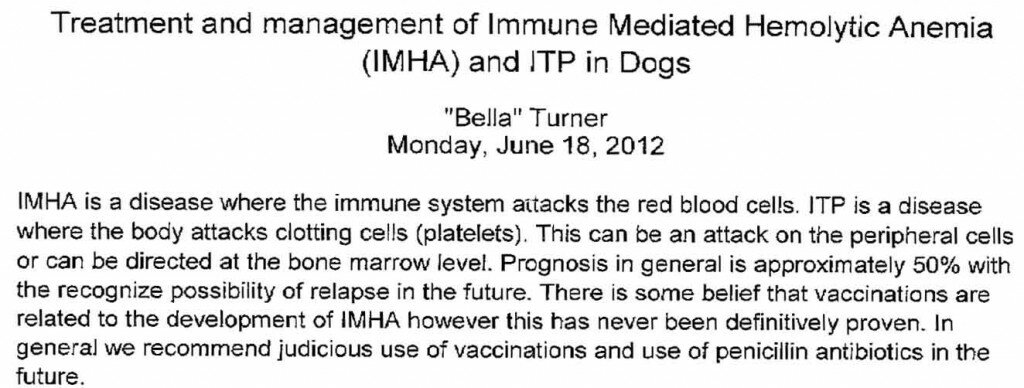 | ||
| https://www.yousendit.com/folders?addFileStatus=success&fIds=Y1RybUpZWlRrUmw1VEE9PQ |
Click on the link above to listen to Lori on the Martha Stewart show
Just click on the link and Download the show!
We humans don’t get childhood shots
repeatedly throughout our lives.
Why do our pets?
Top vet schools and these major veterinary organizations have changed their recommended vaccination guidelines to reduce the “vaccine load” on dogs and cats: The American Veterinary Medical Association, the World Small Animal Veterinary Association, the American Animal Hospital Association, the American Association of Feline Practitioners and The American Holistic Veterinary Medical Association.Unfortunately, changes have been slow to come to the veterinary clinic level.
Why does this matter? Unnecessary vaccination increases the risk of adverse vaccine reactions but does not increase immunity to disease.
Click below to sign the petition!
Important: This website does NOT oppose all vaccination.
This website DOES OPPOSE:
- vaccination without prior explanation of risks, benefits, vaccine effectiveness and duration of immunity
- revaccination of animals that already have long or lifetime immunity
- “one size fits all” vaccination protocols
- multiple vaccines given in one visit, especially to cats and small breed dogs
- optional vaccines routinely given to pets not specifically at risk
- optional vaccines offering short immunity, limited effectiveness and high adverse reaction rates
- vaccination of unhealthy animals
- vaccination before or during surgery
- vaccination of animals too young to form immunity
- vaccination with vaccines on the “not recommended” list of the AVMA, AAHA and/or WSAVA
- vaccine labels suggesting revaccination intervals sooner than supported by current research
Veterinarians: Fully Inform Us Before Vaccinating Our Dogs and Cats
We, the petitioners, are not opposing all vaccination. We oppose unnecessary vaccines and the unnecessary revaccination of adult pets. We oppose vaccination without informed consent.
Because vaccine damage may not be evident for weeks, months or even years, your veterinarian may never link vaccination to health or behavior problems. Though severe vaccine reactions are not common, even moderate reactions can be catastrophic for animals and their human families. Aside from physical and emotional tolls, treatment can cost hundreds, even thousands, of dollars and may never restore good health. Who pays to treat vaccine reactions? We do. Who cares for vaccine-damaged pets -- or mourns their loss? We do. Who deserves to be fully informed about risks versus benefits? We do!
Top veterinary schools, all major American veterinary associations and The World Small Animal Veterinary Association have changed their vaccination recommendations for dogs and cats to reduce the “vaccine load” and prevent adverse reactions. Research scientists and concerned veterinarians have been pleading for this change since the 1970’s.
Unfortunately, most veterinary clinics have changed vaccination protocols very little or not at all. They continue to revaccinate animals that already have immunity, unnecessarily risking adverse reactions that come from repeated vaccination. Optional vaccines with low effectiveness and high reaction rates, vaccines that should be given only under special circumstances (if ever), continue to be given routinely. Chances are your dog or cat was vaccinated unnecessarily. Most are. Ours were.
Just some of the vaccine reactions listed in the 2011 American Animal Hospital Association Canine Vaccination Guidelines (sponsored by four drug major companies) include:
Acute Reactions (within 72 hours)
• allergic reaction
• anaphylactic shock
• collapse
• seizures
• loss of consciousness
• lack of coordination
• death
Chronic reactions (long-term)
• cancer
• autoimmune disease
• arthritis
• behavior change
• hair loss
• skin disease
• AIHA/IMHA (a serious autoimmune blood disease)
Cats suffer many of these same reactions. Vaccine-associated sarcoma (a malignant, highly invasive cancer) is especially problematic for cats and is on the rise in dogs and ferrets.
Help Stop Unnecessary Vaccination
Please sign this petition then go to Truth4Pets.org. There you’ll find Questions to Ask Before Vaccinating Your Dog or Cat plus videos, studies, case histories and articles explaining what vaccination experts believe. Be sure to share this petition and website with animal-loving friends and people influencing your pet’s vaccination -- groomers, trainers, boarding facilities and veterinarians.
By signing this petition, tell veterinarians we want the same rights to full disclosure medical doctors give humans before vaccinating. Tell pet insurance companies to encourage titer testing and to stop reimbursing and promoting unnecessary vaccination. Tell veterinary educators to start requiring mandatory continuing education in vaccinology and immunology. And tell the USDA to grant us easy access to reported adverse reactions for all companion animal vaccines, and to allow only scientifically-proven revaccination recommendations on vaccine labels.
Together we can send a message: The time has come for veterinarians to stop vaccinating our pets without first disclosing all risks and benefits and obtaining our informed consent.
Disclaimer: The information provided here is for educational purposes and is not a substitute for professional care.
Learn the facts:
Search by subject or category or cloud tag (at right)
Read 7 Quick Things Most People Don’t Know About Vaccinating Pets
Read Ask These Questions BEFORE Vaccinating Your Pet
Attention Veterinarians, vet techs, Certified Animal Welfare Administrators and others interested in serious education on titer testing see Dr. Ron Schultz’s Saving Lives with Antibody Titer Tests speaking in a video approved for RACE continuing education credits.
Learn about vaccine reactions.
| |
| Educate Before You Vaccinate |
 |
| http://www.vetnegligence-vaccines.com/ |
Angel Kitty Kat Gonzalez was a beautiful and sweet long haired Tortoiseshell cat. I had never owned a cat before Kitty Kat showed up on my doorstep in the fall of 2003. I had just moved from Rockport, Texas, to Corpus Christi, Texas, with my other fur baby, Sissy. Sissy is a miniature dachshund who is scared of her own shadow. Kitty Kat became Sissy's very welcomed friend and protector immediately. When Sissy went outside to "do her business" Kitty watched over her to make sure she made it back in through the doggy door safely. Kitty was very independent and loved to bring me "live" birds as presents to show her love.When I took my pets to the veterinarian for wellness or illness visits I never questioned their care or treatment. I was naive in believing that my veterinarian was up to date on the latest and best medical care. I believed they loved my fur babies as much as I did. My baby, Kitty Kat, was euthanized on February 14, 2011, due to Vaccine Associated Sarcoma. I am currently involved in litigation against the veterinarian who treated Kitty Kat. I LOST......It's official....Corpus Christi now has the lowest standard of veterinarian care. I lost my veterinarian lawsuit because "if all Corpus Christi veterinarians adhere to same standards then it's not negligence". So what this means is the veterinarian standard of care in Corpus Christi, Texas, is......
a. The Corpus Christi veterinarian DOES NOT have to explain to you what vaccines he recommends, he can just inject your animal with whatever vaccine he wants.
b. The Corpus Christi veterinarian DOES NOT have to explain to you the risks and benefits of the vaccines they inject.
c. The Corpus Christi veterinarian DOES NOT have
to obtain informed consent from the animal guardian.
d. The Corpus Christi veterinarian DOES NOT have to use the safest vaccines available.
e. The Corpus Christi veterinarian DOES NOT have to follow instructions on the vaccine manufacturers label.
F. The Corpus Christi veterinarian DOES NOT have to
perform a feline leukemia blood test to check for exposure prior to injecting a
feline leukemia vaccine. Or even offer the blood test to the pet guardian.
g. The Corpus Christi veterinarian DOES NOT have to inform pet guardians that
Corpus Christi allows a three year rabies vaccine, they can continue to inject
the rabies vaccine into your pet ANNUALLY subjecting them to over vaccination illnesses while banking profits.
h. The Corpus Christi veterinarian DOES NOT have to follow the recommended vaccination schedule set forth by The American Veterinary Medical Association, American Animal Hospital Association, The American Association of Feline Practitioners, and Texas A & M University.
Thanks Judge Brent Chesney for adding another LOW standard to Corpus Christi.
wE aRE siGniNG thE PETitioN....
aRE yOu???
Click here to go to site













I am so surprised by all this I will definitly ask questions next time ,i am so sorry for your loss,Thank you for what you are doing
ReplyDeleteRead here what can happen to cats www.vetnegligence-vaccines.com
ReplyDeleteHi Jena
ReplyDeleteThank you so much for sharing the story. I added your information to make sure people understand that this is something happening to all of our pets. Dogs and Cats!
Be Blessed!
Jean Robb
My dog was hospitalized not once but twice from vaccinations. It took the 2nd time happening to realize it was from vaccinations. The first time was when he was a year old. It didn't happen the same day he was vaccinated, he was fine right after. A few days later he started vomiting and had diarrhea, the vet said to just watch him that day. As the day went on he got worse. By evening he was vomiting more and diarrhea, even at the same time and started shaking uncontrollably. I immediately took him to the animal hospital where they put an IV for about an hour and gave him medicine. I didn't know what was wrong but thought Maybe he ate something. I had searched for the problem and found small pieces of deodorant under my dresser that must've come off the cap, however, vets said it shouldn't have gotten him that sick if he did. Plus, it was in a hard to reach spot so didn't think it was likely but thought it couldn't be anything else. It was a mystery. I brought him home and Kept checking on him, thank god I did bc 2 hours later his gums were so pale. I rushed him back to the hospital. When we arrived his heartbeat was very faint, I could barely feel it and wasn't responding to anything. They immediately worked on him and finally got him in stable condition but had to stay there. He spent 3 days at the hospital. The following year when he received his shots, again a few days later he started vomiting and diarrhea and then the shakes started. This time he spent 24 hours at the hospital. I said there was no way he ate anything he shouldn't have and realized this couldn't just be a coincidence that he's hospitalized just days after vaccinations. Someone told me of a similar experience they had and now they make the vet give her dog only half the amount since they give small dogs the same amount as big dogs(I had no idea) my dog is also small and they give him all his shots at once which I hear is also a problem. Just wanted to share my story so this doesn't happen to others.
ReplyDeleteThank you so much for sharing your story. I really believe we need to keep telling people. I think most pet owners think it will never happen to them. Thanks so much for caring!
ReplyDeleteBe Blessed!
Jean Robb